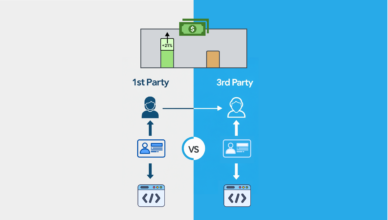In the online publishing industry, collecting vast amounts of big data is a thing of the past. Working with unlimited quantities of data is not only a waste of time and resources, but it can also leave you open to the short- and long-tail damage of a data privacy breach.
We’ve found that adopting data minimisation is key to a privacy-first approach. It enables you to leverage compliant, quality data as an opportunity to create a virtuous cycle based on trust. When publishers minimise their data gathering, shorter storage time provides fresher, more accurate, privacy-friendly and energy-efficient data. This in turn creates a win-win where all digital teams and roles can optimise their strategic efficiency, reduce their costs and significantly boost the value of their brand.
What is data minimisation?
A key element of modern data privacy legislation, data minimisation is a principle that encourages organizations to collect and process the minimum amount of data they need to carry out business operations.
It’s about doing more with less data.
Moving beyond the philosophy of collecting, storing and accumulating massive data, minimisation is the practice of limiting the collection of personal information to that which is directly relevant and necessary to accomplish a specified purpose.
By minimising their data, team and roles across the entire publishing organisation can mitigate the risks of collecting unlimited volumes of information and leverage a wide range of benefits.
What are the privacy risks of big data collection?
With the universe of accumulated data set to hit over 160 zettabytes by 2025, publishers have become used to having easy access to unlimited quantities of information as well as the unprecedented powers it can bestow. However, companies have never faced greater risk with respect to their data than they do today. The industry is self-regulating at an ever-increasing rate, and there are a growing number of GDPR-inspired privacy regulations for how governments and businesses are permitted to handle personal data. Moving forward with a privacy-centric approach has not only become an ethical issue, but a legal necessity.
When publishers minimise their data collection, they can considerably offset the risks of legal consequences following a data privacy breach. Under the Australian CDR, these include the upfront costs of court action. Then there are the longer-tail costs. Managing a conviction for a data privacy breach takes up a considerable amount of time and resources, not to mention funds.
Business disruption can also be considerable with revenue losses because of system downtime and reduced customer turnover.
Beyond the short-term financial impact, the most significant damage from a breach is the lost business caused by damage to a company’s reputation — this applies to customers, investors and the long-term perception of the brand.
What are the benefits of data minimisation for publishers?
Minimising data collection has a considerable range of benefits, from cutting costs to streamlining internal operations and boosting your brand’s image.
Drive efficiency → Act faster → Improve your strategic vision
Data minimisation is the cornerstone of optimising your data management practices. Reducing data to the essential minimum enables digital teams to simplify their collection and tagging and have a clear vision of the data being processed.
- Minimal data facilitates analysis and interpretation, which empowers teams to be more responsive.
- Dealing with fewer requests speeds up the processing and analysis time — a more efficient API data flow means that data can be sent more rapidly to the data warehouse.
- Reducing storage time provides fresher and more accurate data, giving you confidence in your strategic decision-making.
Cut out unnecessary overheads
The practice of collecting and storing unlimited amounts of data is increasingly outdated. Aside from the daily running costs of keeping hold of obsolete data there are potential risks of fines from non-compliance.
- Data storage capacity and maintenance are expensive, and reducing your collection to the necessary minimum removes the need to fill up servers indefinitely.
- Costs are elevated by analysts and all other teams that are needed to ingest, digest, analyse and otherwise make sense of data.
- The amassing of data, particularly sensitive data maintained in unsecure legacy systems, can increase the risk of breaches and the associated costs and collateral damage.
Leverage ethical and privacy-centric analytics
As the digital marketplace evolves into a trust economy, the most valuable asset online publishers have is the confidence customers have in their commitment and ability to protect their privacy and data. Keeping data as clean as possible limits associated privacy and security risks — and enables businesses to ensure they limit their personal data collection, storage and usage to data that is relevant, adequate and necessary for carrying out the purpose for which the data is processed.
- Rising public awareness of the importance of personal data and how it is handled makes it a priority for brands to gain the trust and loyalty of its customers. Unverified, outdated or inaccurate data is a liability to a brand’s image.
- Companies that implement a comprehensive ethical privacy strategy in turn provide better customer experiences, which inevitably leads to improved CTRs and customer retention.
- Privacy-by-design browsers offer safer and faster online journeys as the majority of the tracking is blocked.
Keep your analytics eco-friendly
Data collection and storage have a huge ecological cost. Processing less means polluting less. Companies can embark on more intelligent energy consumption by only turning on servers when they are required.
- By optimising log management, companies can save on the 90% of logs that are never used.
- Minimalist tagging schemes and intelligent processing systems only enrich the data when necessary, avoiding wasted resources.
- Pooling resources in the cloud consumes less energy and is more environmentally friendly.
3 steps for implementing data minimisation
Reducing the amount of data you collect as part of a data minimisation project is part of efficient data governance strategy. Before diving into how your organisation can go about minimising its data, make sure that you have a full understanding of your existing data infrastructure:
First, carry out a comprehensive inventory of the amount of personal information you’re holding, where and how it’s stored and who uses it. This needs to be within the framework of the organisational scope of control — data/information for managing operations or running your business. The aim is to map out where and how your data is collected and stored.
Then, identify all the relevant stakeholders involved in your data collection practices, from executive level to publishers, content/SEO strategists, digital marketing and tech professionals. This can include representatives in privacy, data management, IT, legal, risk and compliance.
Finally, with the above experts, set out precisely what data you intend to keep, how long you plan to keep it and where you will store it. This involves defining the scope of what information to collect, what data is acceptable and how your organisation will handle questions concerning both your current data and information you will collect in the future.
By ensuring that privacy-driven minimised data collection is at the center of their market strategy — integrating advanced technologies and adopting a proactive approach to performance monitoring and improvement, as well as compliance through tools such as Data Protection Impact Assessments (DPIA’s)—online publishers can leverage privacy-compliant, quality data as an opportunity to create a virtuous cycle based on trust, boost operational efficiency and elevate the value of their offering.









